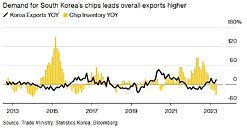- Joined
- May 21, 2024
- Messages
- 675 (3.63/day)
South Korea's stock of semiconductor chips dropped more than it has since 2014. This big decrease shows that customers are buying chips faster than companies can make them, as they need more equipment for developing artificial intelligence (AI) technology. Official data released on May 31 revealed that in April, chip inventories fell by 33.7% compared to a year earlier - the largest drop since late 2014. This is the fourth month in a row that inventories have declined, while at the same time South Korea's exports of semiconductors have gone up again. Additionally, South Korea's production of chips rose 22.3% in April, which is less than the 30.2% increase from the previous month. Shipments from factories grew 18.6%, also lower than March's 16.4% growth.
South Korea is home to the two biggest memory chipmakers in the world (Samsung and SK Hynix), and they are competing to supply chips to NVIDIA, the latest having an insatiable appetite for more and more chips. These two Korean companies are in a race to develop a more advanced and more profitable version of high-bandwidth memory, or HBM. During the memory chip boom from 2013-2015, inventories didn't increase for about a year and a half. In the 2016-2017 cycle, inventory declines lasted nearly a year. A report from South Korea's central bank expects the latest surge in chip demand to continue at least until the first half of next year. This is because the "artificial intelligence boom" is driving up demand similarly to how cloud servers caused an expansion in 2016, and now mostly forgotten crypto-mining fever. South Korea will release its latest export data on June 1.


View at TechPowerUp Main Site | Source
South Korea is home to the two biggest memory chipmakers in the world (Samsung and SK Hynix), and they are competing to supply chips to NVIDIA, the latest having an insatiable appetite for more and more chips. These two Korean companies are in a race to develop a more advanced and more profitable version of high-bandwidth memory, or HBM. During the memory chip boom from 2013-2015, inventories didn't increase for about a year and a half. In the 2016-2017 cycle, inventory declines lasted nearly a year. A report from South Korea's central bank expects the latest surge in chip demand to continue at least until the first half of next year. This is because the "artificial intelligence boom" is driving up demand similarly to how cloud servers caused an expansion in 2016, and now mostly forgotten crypto-mining fever. South Korea will release its latest export data on June 1.


View at TechPowerUp Main Site | Source









